“I guess I have a short attention span! I'm interested in new worlds, new universes, new challenges. I always said the only reason to make a film is not for the result but for what you learn for the next one.” -Alfonso Cuarón
April has gotten off to a great start here at Starts With A Bang, with some amazing stories and some unique features you won't find anywhere else! Here's what the past week had in store:
- Does the climax of the movie 'Gravity' violate simple physics? (for Ask Ethan),
- LIGO's director explains what it's like to find a gravitational wave,
- What do star trails look like from the ISS? (for Mostly Mute Monday),
- Why are Earth-orbiting satellites fundamentally unstable?,
- Galileo didn't invent astronomy, but he DID invent mechanical physics, and
- What is the most astounding fact about the Universe?
 Image credit: Adam Block/Mount Lemmon SkyCenter/University of Arizona, of the Hercules Galaxy Cluster, under a c.c.a.-s.a.-4.0 license.
Image credit: Adam Block/Mount Lemmon SkyCenter/University of Arizona, of the Hercules Galaxy Cluster, under a c.c.a.-s.a.-4.0 license.
That’s quite a week, particularly given the exclusive interview with Dave Reitze, executive director of LIGO. Our Patreon supporters are genuinely making a whole lot of things possible; I'm very excited about my big gravitational waves talk (on April 18th), I'm planning out this month's podcast (on Planet Nine), we're 88% of the way towards unlocking our next Patreon goal, and I'll be recording an audiobook version of Beyond The Galaxy, which is also getting a Chinese (Mandarin) translation! Now, without further ado, it's onto our Comments Of The Week!
From Omega Centauri on rotation in the movie Gravity: "Even if the station isn’t rotating, the the astronauts are rotating wrt to the tether attachment the effect would be the same."
This is one of the tough things to understand about angular momentum, as compared to what we normally think of as old-school (Galilean) relativity and linear momentum. If you had the astronaut and the ISS moving at some speed relative to one another, then their center-of-mass frame (or center-of-momentum frame) is equivalent whether it's the ISS or the astronaut that's in motion. But if you have an astronaut orbiting the ISS at a certain speed or the ISS rotating at that same angular rate of rotation, the total angular momentum of the system would be very different.
Angular momentum -- the quantity that's conserved -- is going to be L ~ m*v*r for the astronaut, assuming that m is the mass of the astronaut, v is the speed of the astronaut around the ISS and r is the distance of the astronaut from the center of mass. But for the spinning ISS, L ~ Iω, where I is the moment-of-inertia (proportional to the mass and to R^2, where R is the radius) of the ISS, and ω is the angular velocity (v/R). So in one case, for the moving astronaut, angular momentum is proportional to the mass of the astronaut, while in the other, it's the mass of the ISS, which at last count has a mass of 419,455 kilograms, or approximately 5,000 times the mass of a typical astronaut. So a rotating ISS would create a problem that's about 5,000 times stronger than the rotating astronaut scenario, something to keep in mind.
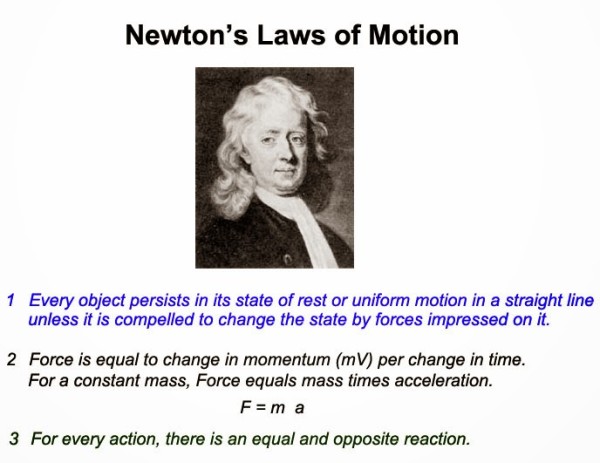 Image credit: © Copyright 2016 ME - Mechanical Engineering, via http://me-mechanicalengineering.com/newtons-laws-of-motion/.
Image credit: © Copyright 2016 ME - Mechanical Engineering, via http://me-mechanicalengineering.com/newtons-laws-of-motion/.
From Neil Nelson, playing "gotcha" and winning: "Every physics student knows Newton’s Second law is F=ma, not his third law."
Yup. I said it was the third, and I was wrong; it's the second. How dare I!
From Denier on global warming, continuing from last week's comments of the week:"You have written words to the affect of when you look at periods of time longer than 17 years so as to eliminate the short term variability that weather causes, the correlation between the rise in global temperature and rise in CO2 becomes evident. Why is the same treatment NOT given to the correlation between rising CO2 and falling humidity*?
In the original thread are links to statements made by Dr Roy Spencer of UAH, John Cook of Skeptical Science, and Carl Mears of RSS all acknowledging the falling humidity, its impact, and the collective failure of the climate science community to definitively explain it.
It is important because all of the climate models require a positive water vapor feedback to create their predicted warming signal. The predictions are all high largely because water vapor is stubbornly refusing to cooperate."
This is potentially important, and potentially a game-changer, depending on how things turn out. There is a not-necessarily-crazy theory that as CO2 rises, the amount of water vapor in the atmosphere -- something which varies tremendously, is a strong greenhouse gas and is of order ~1% of our atmosphere (rather than being measured in hundreds of ppm like CO2) -- falls. Falling humidity is an observed correlation with rising CO2, and so, the argument goes, water vapor may fall as well. This is potentially important, potentially interesting, and would represent a new line of inquiry in the field of climate science.
But that would still require explaining the observed correlation between rising CO2 and rising temperatures. There are other theories out there...
 Image credit: Jonathan DuHamel, via https://wryheat.wordpress.com/2014/11/15/national-climate-assessment-la….
Image credit: Jonathan DuHamel, via https://wryheat.wordpress.com/2014/11/15/national-climate-assessment-la….
...but it's important to recognize that what you're proposing is a potential refinement, caveat and modification to what is presently the leading theory: that CO2 from human-caused sources is driving the currently observed increases in global temperatures.
Just because we can't explain everything with a scientific theory (e.g., we don't discount evolution because it doesn't explain the origin of life, or the Big Bang because it doesn't explain the origin of space and time) doesn't mean we abandon the scientific theory when it appears to be valid. This one is pretty robust, although there are still improvements to be made and there is still more to learn. I know we'll both be looking for the new findings and the new pieces of knowledge as they arise.
From Joshua W Davies Jr MD on... LIGO, perhaps?: "I believe that infinite pure energy is the essence and ground state for all expressions that make up what we currently think of as the here and now of our finite volume of mass(the entire universe)."
I don't really know what to say to this comment, so I'll let my good buddy Tracy Jordan handle it:
Image Credit: SXS, the Simulating eXtreme Spacetimes (SXS) project (http://www.black-holes.org).
From Paul Dekous, once again not believing the LIGO results or conclusions: "A pity that Ethan didn’t question the certainty of the match between what’s measured and the proclamation that it were two Black Holes merging. ATM I would prefer the use of ‘hypothesized’ and wait for more data to be collected for a confirmation and a reference frame of an other GW-signal..."
So, this has gotten kind of boring, explaining the same thing over and over again and for you to keep saying the same invalid objection. So here's some news for you: keep your eyes peeled next month for the announcement of the second LIGO discovery, ok? Just a hunch...
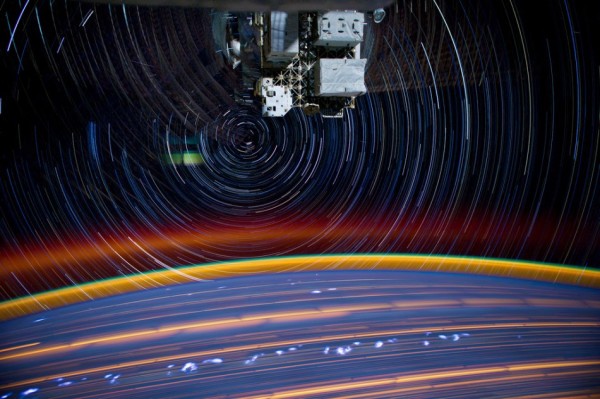 Image credit: NASA / Astronaut Don Pettit / @astro_pettit on Twitter, of the star trails from space and numerous atmospheric features on the Earth.
Image credit: NASA / Astronaut Don Pettit / @astro_pettit on Twitter, of the star trails from space and numerous atmospheric features on the Earth.
From Michael Kelsey and EpiPete on visualizing the ISS' rotation: "s there any software that can help me properly visualize the ISS’s rotation, and where its personal “north star” might be? I’ve got a pretty clear picture in my head for something orbiting around the equator, for example, and keeping one face downward, but the ISS has a fairly inclined orbit, and for whatever reason, my brain wants its axis to be wobbling like the sinusoid of its orbit on a map.
The free version of Systems Tool Kit (STK) from AGI, or the General Mission Analysis Tool (GMAT) from NASA (and others) should work."
I am glad that EpiPete was here, because I could not have given you that information on my own. Thank you, EpiPete!
Image credit: E. Doornbos, TU Delft, of how atmospheric density changes with altitude. Note that the density does NOT drop to zero, even past the definition of where space begins.
From Michael Kelsey again on satellite stability: "Artificial satellites are unstable on timescales of years to decades (which is really the only timescale of interest for technology) because of three issues: varying atmospheric drag, solar wind, and debris/collisions."
I mean, if we wanted to talk about Earth-orbiting satellites in LEO and account for the vast majority of the causes of instability, we could say atmospheric drag alone and account for 95%+ of them. The solar wind and debris/collisions exist and have effects, but it's really rare that they matter. Yes, solar wind and debris/collisions are necessary for the other <5% and for satellites around airless worlds, but I wanted to be comprehensive and mention all the forces that were at play, including the ones that weren't relevant to Earthly timescales.
It was a choice, and I made mine. Sinisa Lazarek agrees with you; Denier agrees with me; I wonder what other people think. Hey, we can find out! Let's try it:
When asked, "what is the scientific cause of X?", do you prefer hearing about:
— Ethan Siegel (@StartsWithABang) April 9, 2016
We'll be here for three days before the poll closes, so make sure to vote before Wednesday at Noon (PDT)!
From Omega Centauri: "What Newton had also was world class mathematical chops. So Galileo developed many of the ideas, but it took a first class mathematical theorist to fully develop the ideas. Kind of like Faraday and Maxwell."
I hadn't thought of this analogy, and I think it's a great one! I had some (semi-)private communication with science historian Thony Christie (who wrote the Aeon piece), he agrees that despite the influence other, lesser-known scientists had on Galileo, his experimental design, setup, execution and conclusions were both genius and original. So were Faraday's experiments, their designs, setups, executions and Faraday's conclusions that he drew, except for electricity & magnetism. It's like Galileo and Faraday cleared a path and wandered down it, and then Newton and Maxwell paved it and drove over it. Incredible feats on the parts of all!
And finally, from See Noevo in the troll department: "Did you ever stop to think that the entire evolution extravaganza (biological and cosmological) stands on one thing, and one thing only.
[...]
The entire edifice of evolution stands on one thing: TIME.
Specifically, on man’s presumed *infallible* measurement of deep TIME."
Time could be quite different, actually, from what we perceive and claim it to be. Evolution -- cosmic and biological -- requires the passage of time, otherwise the Universe would be static and non-evolving by the definition of stating and non-evolving, but so long as time exists, even if it's not fundamental or what we think it is, so does evolution.
 Image credit: U.S. DOE, NSF, CPEP and LBNL, retrieved from http://physics.gla.ac.uk/.
Image credit: U.S. DOE, NSF, CPEP and LBNL, retrieved from http://physics.gla.ac.uk/.
Actually, I can't bring myself to end on a See Noevo comment for the second week in a row, so here's one more from Pierce R. Butler that I can't quite answer: "I can’t locate a source for this somewhat contrarian quote, but it does seem quite widespread: “Then again, e=mc^2 may only be a local phenomenon.” — Albert Einstein"
I would say this is quite possibly the difference between something we can say about the Universe in flat, Euclidean, special-relativistic spacetime -- which is that E = mc2 -- and something we can't state in General Relativity. That is, energy is kind of a globally ill-defined quantity, one that's certainly not conserved. And yet, the total amount of mass in the Universe at any instant is able to be well-defined. Is it possible that globally, there is a more fundamental equation that we haven't discovered, or that E = mc2 breaks down? Absolutely. There's a limit to what we know.
But I would like to quote physicist Janet Conrad, who also has a very fun and interesting addendum to that equation, that may also talk about the limits of E = mc2:
"The research that I do is on a particle called the neutrino. And for a long time we thought that neutrinos were massless particles. And when I started, my sister said how is it possible that a particle can be massless? Because when she thinks about a particle she thinks about a little speck of dust or something like that. Whereas when I think about a particle I think about a little packet of energy coming out of this equation from Einstein, E = mc2. And, in fact, the whole equation is E is equal to mc2, the amount of energy the particle would have if it was sitting still, plus the extra energy that it would have if it has any motion. And if you think about it in that equation, if you now say E is equal to mc2 plus this energy of motion, you could set the mass equal to zero and you still have energy. And so as far as a particle physicist is concerned, there's still a particle there. It's just a particle that can't ever stop. It always has energy of motion. It's always going the speed of light. So for me there's a lot more to the equation than E = mc2."
There, that's much more satisfying! Thanks for a great week, everyone, and I'll see you back here on Monday for more wonders and joys of the Universe!

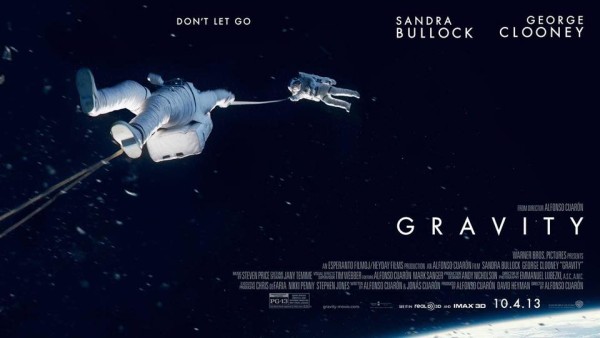
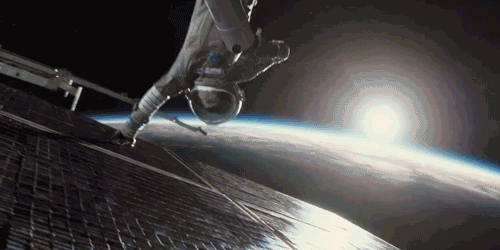
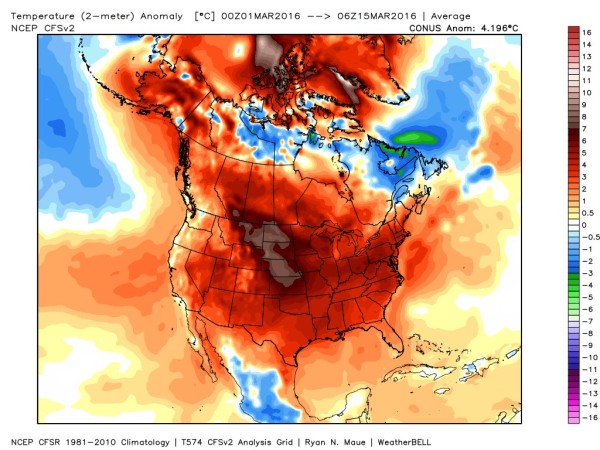
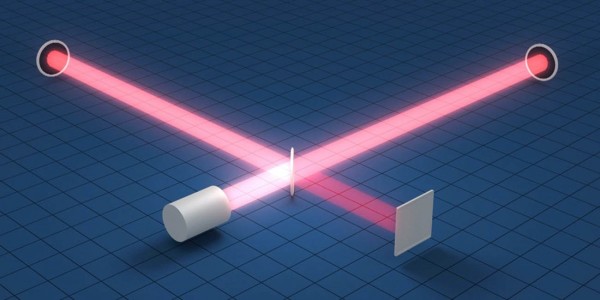

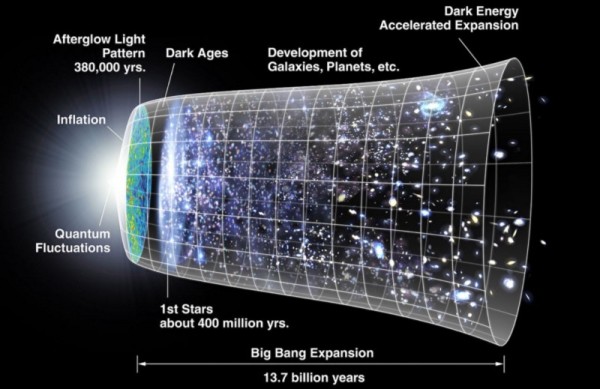
"the amount of water vapor in the atmosphere — something which varies tremendously, is a strong greenhouse gas and is of order ~1% of our atmosphere (rather than being measured in hundreds of ppm like CO2) — falls. Falling humidity is an observed correlation with rising CO2, and so, the argument goes, water vapor may fall as well. This is potentially important, potentially interesting, and would represent a new line of inquiry in the field of climate science."
As far as I've seen absolute humidity (as opposed to relative humidity, which uses the capacity of the air to hold water vapor as a denominator) has increased 4-5 percent. Based on physics, we would expect absolute humidity to go up, warmer air can hold more vapor, rates of evaporation increase rapidly with temperature etc. It is also reasonable to expect that evaporation can't rise exponentially with temperature (as the saturation vapor pressure does), since the supply of heat necessary is limited, so a simple handwaving argument would raise the expectation that absolute humidity would rise, and relative humidity fall. In any case anything from the well known denier Spencer should be assumed to be junk science until shown otherwise.
@Ethan: Thank you! I don't mind disagreeing on points of style (it is your blog after all, not mine :-), and I'll be quite interested to see how your poll shakes out.
@Michael #2: So far, I'm scared that 25% of the votes are for aliens; perhaps I'm doing this all wrong after all!
@Ethan, Whelp, maybe that'll inspire your haircut for this year's Halloween costume! And sponsorship from the History Channel....
discussing big bang is like discussing birth of God while you dare abort or kill any other birth for science. Amazing the atitude of because i can every time ethics is spoken of about a Creator while others say if he doesn't do anything about it then we're free to do it. So you have all these perverted new sex laws requested of in America
it is things like this which is why the process of eliminating aging to any organic via C-14 hasn't been shown to you until He is ready to change the planet again, and see if 8 billion people lift a finger to survive it. Lots of luck to you all.
BAAAAD ETHAN!
The third law has a point that is often missed and solves a problem with people trying to work it out at the first reading of it.
For every action there is an opposite and equal reaction THAT ACTS ON DIFFERENT BODIES.
So you push the cart and the cart pushes you. The reason why you don't end up going nowhere is because the reaction is to you, not to the cart.
A very important point, otherwise the net force being zero would kill motion without a third body to be involved, making the third law rather irrelevant.
"As far as I’ve seen absolute humidity (as opposed to relative humidity, which uses the capacity of the air to hold water vapor as a denominator) has increased 4-5 percent. "
You are correct and that is why deniers' obsession is nothing more than a "LOOK!!! SQUIRRELS!!!!" moment. Full of sound and fury, signifying NOTHING.
"discussing big bang is like discussing birth of God"
Nope, not in the least.
They're about as close as discussing "You know what I mean" from a disgruntled wife and discussing whether the blue dress works better with flats or heels.
Because one is a concrete (well, definitely defined) thing - TBB - and the other means any old cack that the person thinks they mean from moment to moment, - Gawd.
That's a massive difference.
It's as relevant to talk about god as it is to answer what the difference between a duck's legs are. The query is entirely undefined.
Merely trying to equate the two as you have and then propose both "equally bad", you have merely garnered the tu quoqu fallacy, which at its best is admitting error of the godbotherers in their actions, at worse saying you won't do anything about changing your errors.
"discussing big bang is like discussing birth of God while you dare abort or kill any other birth for science"
The biggest killer of unborn babies, if it existed, is God.
80% of fertilised cells abort before they pass out the zygote stage. 60% of the remainder die in the intervening months before pregnancy.
And those are MODERN figures, ones where we've done MASSIVE amounts to save the lives of babies, where god has, if it existed, done fuck all for millions of years.
US Postage just went down by about four percent.
Watch your global temperature charts for a correlation ...
"It’s as relevant to talk about god as it is to answer what the difference between a duck’s legs are. The query is entirely undefined.
"
Well then, what relevance should we give your comment? It has no more merit than a ducks shit so how do we categorize you Duck Shit Speak?
"Well then, what relevance should we give your comment?"
And that's another non question.
We expected no better from a retard such as yourself.
The PREMISE of the movie "Gravity" is bogus because of basic orbital mechanics. Two satellites collide, and the debris field is going SO fast that it shreds the Shuttle. If the debris field is going that fast relative to the Shuttle, it's in a different orbit, and it will NOT collide with the space station or Shuttle again.